Apply now to join our next cohort of Community Science Fellows and Community Leads!
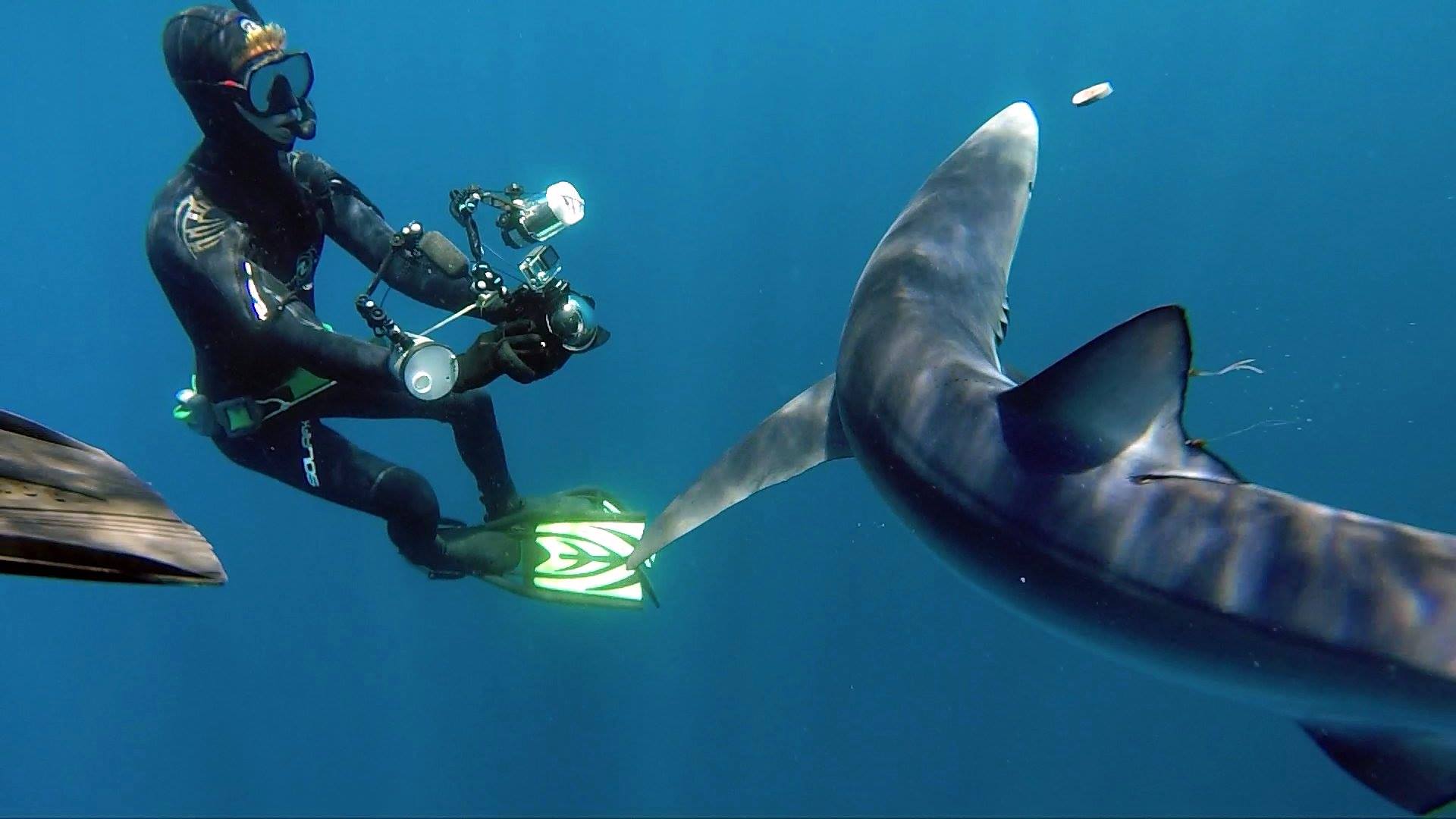
Image courtesy of Michael Bear
The San Diego Coastline supports a variety of marine life in habitats as diverse as kelp forests, seagrass beds, rocky intertidal zones, marshes, and mudflats. The coastline also attracts a significant number of scuba divers, some of whom photograph the animals and plants they encounter while diving. In this area, the interest among divers in participating in marine citizen science efforts has been slowly growing. In 2014, two divers established a nonprofit organization, Ocean Sanctuaries, to help initiate and organize marine citizen science efforts and create a community of open data sharing.
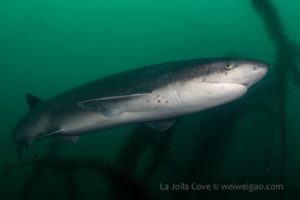
Photo Credit: Wewei Gao
Ocean Sanctuaries (OS) was established as a collaboration between citizen scientists, scientists, and other like-minded organizations to foster greater understanding, wise ecology, species protection and good stewardship of the ocean and related habitats. OS strives to create a community that shares information through multi-media, social media, and the web. They make data and imagery, gathered by citizen scientists, available to the general public, scientists, and other organizations.
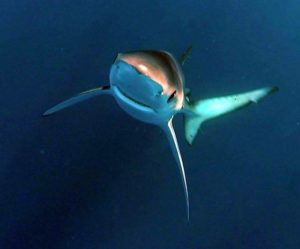
Image credit: Michael Bear
OS organizes a number of citizen science projects; the two projects relevant to this effort are described below:
Both projects have unique challenges when it comes to promoting more community engagement and participation. The Sevengill Shark project requires participants to be highly-skilled divers with specialized equipment and training. Recording “zero data” when sharks are not present is often just as important as recording shark encounters, but it is difficult to maintain enthusiasm about recording “zero data” on dives. For both projects, increasing the motivation for citizen scientists to upload their data where it can be used and analyzed (beyond sharing on social media) is another hurdle. OS wants to increase participation and engagement in their citizen science activities so the data is useful for marine conservation and monitoring efforts; hence the need for a nuanced community engagement plan.
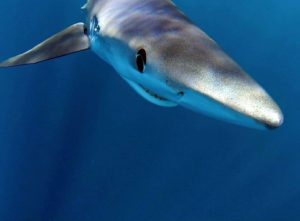
Image credit: Michael Bear
The Ocean Sanctuaries (OS) project team will work together to develop strategies, messages, and tactics to more deeply engage and motivate current volunteers while reaching out to new people. Community engagement goals go beyond expanding data collection; OS wants to spur more involvement, stewardship, and awareness in the San Diego community about marine science issues locally and globally.
The team is hoping to implement engagement strategies that will also address how to increase volunteer awareness and appreciation of data collection protocols and how to collect demographic data for users. The project team will work together to establish ways to monitor and measure community engagement levels and adapt the plan in the future if needed.
Because OS wants to more fully harness the potential of social media, they envision one aspect of this engagement plan including a social media plan (specifically Facebook, Instagram). While the scientist will help OS staff initiate aspects of the engagement plan, all partners will strive to establish a plan that is realistic and achievable with current OS staff and resources.
Ocean Sanctuaries would like help understanding which engagement strategies and messages will be most effective for their citizen science projects. This will help OS and their citizen science community collect more data that is of value to scientific research. Greater involvement from San Diego county residents will inspire local stewardship by connecting people to the ocean and marine life through citizen science. Ocean Sanctuaries hopes this first phase will increase the data available for Phase 2 of this project: “Analyzing Marine Citizen Science Data to Identify Trends and Inform Conservation Policy and Resource Management Efforts.”
Ocean Sanctuaries has a license for Adobe products, as well as a significant stock of photos and videos that could be used in implementing a community engagement plan.
The collaboration between Ocean Sanctuaries and the scientist for this project should begin as soon as possible and could last for 6-9 months. There may be some time overlap and possible coordination with Phase 2 of this project. Key Phase 1 project milestones include:
Project photos: credit: Michael Bear
For reference: the large sea jelly is known as a Purple Sea Nettle (Chrysaora achlyos), and grows up to 20 ft. long, but very little is actually known about them. The shark pictured is the Pacific Blue Shark (Prionace glauca), which, unfortunately, due to by-catch and overfishing, is becoming more and more scarce off the California coast.
Michael Bear and Barbara Lloyd, Co-Founders of Ocean Sanctuaries, will serve as community leaders for the project. Both Michael and Barbara are trained citizen scientists and research divers. Michael is the Citizen Science Director of Ocean Sanctuaries and serves as the primary liaison with scientists on OS projects. Barbara has photography and videography expertise, in addition to software development and IT skills that will be helpful to the project. Both community leaders envision creating content collaboratively with a scientific partner throughout this project. They will provide access to previous social media and engagement-related data and will take the lead on social media posting.
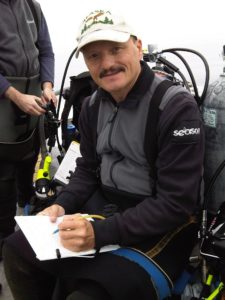
Michael has been involved in marine citizen science training and diving in California for over 20 years. In 2014, he helped co-found Ocean Sanctuaries, which offers various courses in marine citizen science for the general public. He is an PADI Master Diver and AAUS [American Academy of Underwater Sciences] Scientific Diver and lives in San Diego, California.
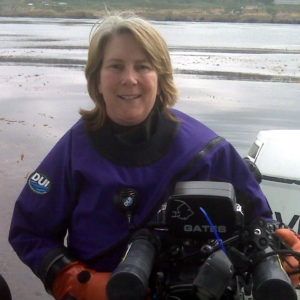 Barbara Lloyd, Community Lead
Barbara Lloyd, Community LeadBarbara has been a volunteer research diver since 2004, for organizations such as San Diego Coastkeeper, San Diego Oceans Foundation, REEF, and Reef Check California. In 2010 she became an AAUS (American Academy of Underwater Scientists) science diver, first with Reef Check California and later with the California Science Center in Los Angeles. Barbara’s commitment to the oceans includes founding Ocean Sanctuaries in 2014, a San Diego non-profit dedicated to collecting data on marine species through citizen science and collaboration with researchers and other like-minded organizations. She is an active Citizen Scientist and manages citizen science projects for Ocean Sanctuaries.
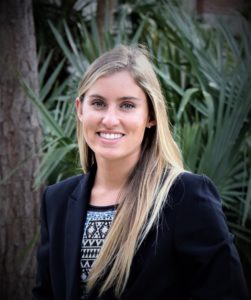
Lizzie Mayes is currently a graduate student at San Diego State University pursuing her master’s degree in Geography. Her research focuses on marine natural resource management. Lizzie has held positions as a marine scientist at an environmental consulting firm in San Diego, and as a fisheries biologist for the state fish and wildlife agency in Florida. She has worked on many research and environmental monitoring projects in a variety of areas, including coastal and offshore fisheries, coral reef ecology, and water quality and aquatic sediment monitoring. She holds a bachelor’s degree in Marine Science from the University of Florida. Lizzie serves on the Ocean Sanctuaries Board of Directors as the Science Communication and Public Engagement Director, and she greatly enjoys getting the chance to promote marine conservation and awareness through their citizen science projects.
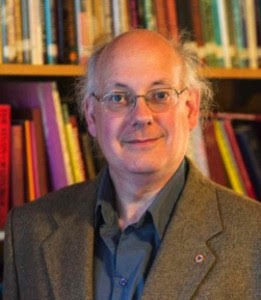 Sheldon Greaves, Community Board Member (Advisory role)
Sheldon Greaves, Community Board Member (Advisory role)Sheldon has been active in citizen science since becoming a member of the Society for Amateur Scientists in 1996. He was on the Board of Directors from 2001 to 2003. In 2010, he was invited to found a new citizen science nonprofit after SAS ceased operations. He was the director of the Citizen Scientists League until it closed in 2014. Sheldon is also a co-founder of Henley-Putnam University, the first private university designed to offer degree programs to members of the Intelligence and Counterterrorism communities. He wrote several of the degree programs and courses, served as Chief Academic Officer and a member of the faculty until 2009. He joined the Board of Ocean Sanctuaries in 2015, and developed educational materials and courses for training citizen scientists. Sheldon holds a Ph.D. in Near Eastern Studies from the University of California at Berkeley.
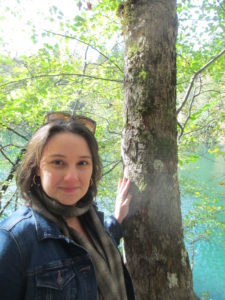
Alison is the Citizen Science Coordinator at the Smithsonian Environmental Research Center (SERC). She joined SERC in 2014 to develop and coordinate its citizen science programs. Alison works with researchers, interns, educators, volunteers, and students to actively involve non-professional scientists in original scientific research. She works on a wide variety of projects with topics ranging from archaeology to oysters in both Maryland and in California. Prior to working at SERC, Alison worked as an adjunct professor at the University of San Diego and as an instructor with Reality Changers, an educational non-profit that provides mentoring and tutoring for first-generation college students. Alison earned her Ph.D. in Oceanography from Scripps Institution of Oceanography, University of California, San Diego, where she was a National Science Foundation GK-12 Teaching Fellow. She earned a B.S. in Marine Biology and a B.A. in Hispanic Studies from the College of Charleston.
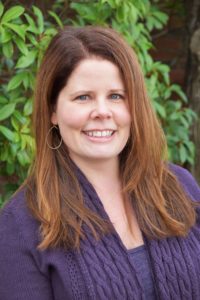 Jill Petraglia Parsons, Community Science Fellow
Jill Petraglia Parsons, Community Science FellowJill is the Associate Director of Science Programs at the Ecological Society of America (ESA) where she manages a diverse portfolio of programs that build capacity, facilitate connections, produce syntheses, and promote engagement in the scientific community. She holds a B.A. in Environmental Sciences and Policy from Duke University and an M.A. in Anthropology of Development and Social Transformation from the University of Sussex. Her interests include meeting facilitation, training, interdisciplinary collaborations, and community science.
(c) 2024 Thriving Earth Exchange